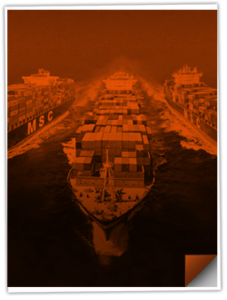In today’s interconnected world, trade sanctions have become a powerful tool that governments use to influence foreign policy. For those in shipping, freight forwarding, customs brokerage, and global logistics, these sanctions can disrupt operations, increase costs, and upend long-established trade routes. But what exactly are trade sanctions, and how do they affect international supply chains?
What Are Trade Sanctions?
Trade sanctions are regulatory actions imposed by one country (or a group of countries) to restrict or prohibit trade with another country. These measures are designed to influence political or economic behavior, enforce international law, or support humanitarian goals. In logistics terms, trade sanctions act like red lights—halting or severely slowing trade flows.
Sanctions can come in many forms, including:
- Tariffs and trade restrictions
- Quotas or full embargoes
- Bans on exports/imports of specific goods
- Financial restrictions and denied-party listings
Types of Trade Sanctions Affecting Logistics
- Economic Sanctions
These include comprehensive trade bans or targeted restrictions on certain industries (e.g., energy, semiconductors, or defense). For logistics professionals, these sanctions often mean:- Limited cargo availability
- Canceled contracts or blacklisted vendors
- Delayed customs clearance
- Arms Embargoes
Restricting the shipment of military goods or dual-use technologies, arms embargoes can impact specialized freight, dangerous goods handlers, and defense industry supply chains. - Travel Bans and Denied Parties
These impact logistics providers by limiting collaboration with individuals or entities under restriction, requiring screening of clients and trading partners for compliance. - Asset Freezes
CBP and financial authorities can block funds and property tied to sanctioned entities, making international payments and customs bond issuance more complicated.
Why Governments Impose Trade Sanctions
- To enforce foreign policy goals
- To respond to military aggression or human rights violations
- To comply with international bodies like the UN or WTO
- To protect national security or economic interests
Sanctions act as economic pressure points, designed to force behavioral change by disrupting trade and financial flows in the targeted region or country.
How Trade Sanctions Disrupt Global Supply Chains
For logistics professionals and import/export managers, trade sanctions often translate to:
1. Supply Chain Disruptions
When sanctions are imposed, certain goods can no longer legally move across borders. This causes:
- Cancellations of inbound/outbound shipments
- Loss of preferred vendors or trade lanes
- Longer lead times and rerouted logistics
Example: A shipper sourcing semiconductors from a newly sanctioned region must quickly find alternative suppliers, often at higher costs and with uncertain delivery windows.
2. Increased Costs and Compliance Burden
Sanctions drive up operating costs in several ways:
- Higher tariffs and transaction fees
- Increased legal and compliance review requirements
- Time and resources spent screening suppliers and verifying origin of goods
Businesses must allocate budget to sanctions screening software, hire trade compliance experts, and may face fines if they unknowingly violate restrictions.
3. Market Volatility and Currency Risk
Major sanctions can cause:
- Commodity price spikes
- Currency fluctuations
- Reduced global demand
Exporters may find that once-lucrative markets are now closed. Importers may face inflated costs for key raw materials due to supply chain bottlenecks. Budgeting and forecasting become difficult in such a fluid environment.
Key Industries Impacted by Trade Sanctions
- Oil & Gas – Subject to sanctions targeting fossil fuel exports/imports
- Pharmaceuticals – Regulated under dual-use and humanitarian exemptions
- Electronics & Tech – Frequent target due to national security concerns
- Agricultural Goods – Affected by retaliatory tariffs or embargoes
Staying Compliant: What Logistics Professionals Should Do
- Monitor Trade Sanctions Lists
Use tools like OFAC’s SDN List, U.S. Department of Commerce Entity List, and CBP Import Alerts to screen partners and cargo. - Implement a Sanctions Compliance Program
Establish policies, train your team, and document due diligence efforts to protect your business from penalties. - Verify End Use and End Users
Certain products—like microchips or aircraft components—may be prohibited even if the buyer is not directly sanctioned. - Use Automated Screening Tools
Trade compliance software can flag risky shipments, restricted items, or blocked entities in real-time. - Partner with a Licensed Customs Broker
Brokers stay updated on evolving international trade regulations and help ensure compliance during customs clearance.
Final Thoughts: Sanctions Strategy as a Competitive Advantage
For today’s global shipper, understanding and responding to trade sanctions is no longer optional—it’s essential. A proactive, well-informed approach to compliance can protect your business, maintain shipping schedules, and even create strategic advantage in volatile markets.
By staying current on sanctions trends, regulatory updates, and supply chain vulnerabilities, logistics professionals can navigate trade disruptions with agility and resilience.



